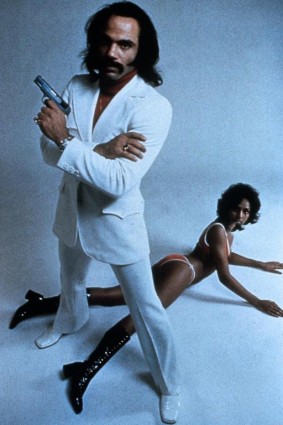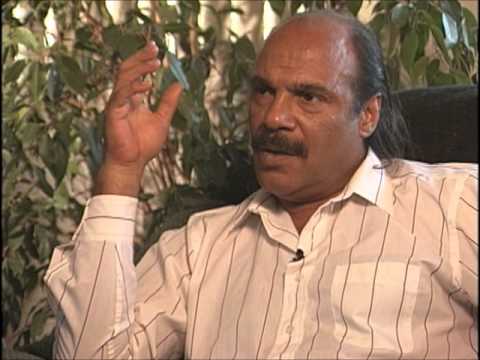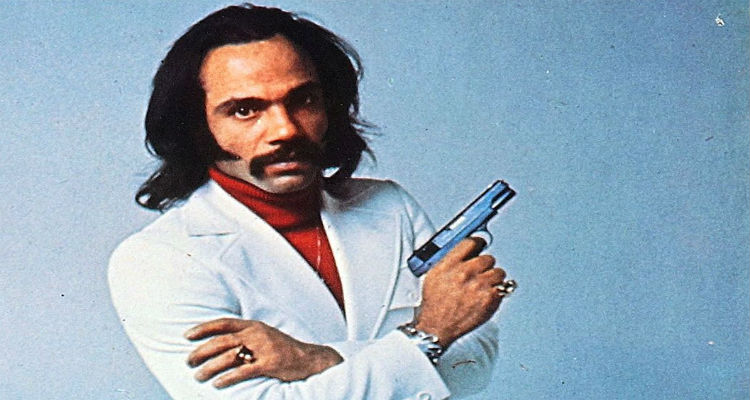Ron O’Neal (September 1, 1937 – January 14, 2004) was an African American actor, director and screenwriter, who rose to fame in his role as Youngblood Priest, a New York cocaine dealer in the blaxploitation film Super Fly (1972) and its sequel Super Fly T.N.T. (1973).
Ron O’Neal grew up in a working-class neighborhood of Cleveland, Ohio, the son of a former jazz musician who now earned his living as a factory worker; his father died when he was 16 years old. Only six months later his brother, who worked as a truck driver, was killed in an accident. Following these tragedies his mother found a job in a hospital in order to sustain the family. After graduating Glenville High School, he attended Ohio State University for a single semester before developing an interest in theater. He joined the Karamu House company in Cleveland, Ohio, working with the oldest African-American theatre company in the United States from 1957 until 1964, during which period he appeared in plays such as Kiss Me, Kate, A Streetcar Named Desire and A Raisin in the Sun, working all the time as a housepainter for a living. In 1967, he went to New York and taught acting at the Harlem Youth Arts Program and appearing in Off-Broadway plays
 His first big break came when he was cast in a Broadway production of Ceremonies in Dark Old Men. In 1970, he was propelled into the spotlight after appearing in Charles Gordone’s Pulitzer Prize-winning play, No Place to Be Somebody. The stirring performance earned him an Obie Award, Drama Desk Award, Clarence Derwent Award and the National Theater Award. He had two minor roles in Move (1970) and The Organization (1971), before being contacted by an old friend from Cleveland, screenwriter Phillip Fenty, who wanted him to play the title role in a film about a drug dealer who wants to leave his life of crime behind him. Shot on a starvation budget, Super Fly became a surprise box-office hit.
His first big break came when he was cast in a Broadway production of Ceremonies in Dark Old Men. In 1970, he was propelled into the spotlight after appearing in Charles Gordone’s Pulitzer Prize-winning play, No Place to Be Somebody. The stirring performance earned him an Obie Award, Drama Desk Award, Clarence Derwent Award and the National Theater Award. He had two minor roles in Move (1970) and The Organization (1971), before being contacted by an old friend from Cleveland, screenwriter Phillip Fenty, who wanted him to play the title role in a film about a drug dealer who wants to leave his life of crime behind him. Shot on a starvation budget, Super Fly became a surprise box-office hit.
O’Neal received both praise and criticism for his performance. And there was even talk of an Oscar Nomination. But the criticism proved too much as he later said, “..the press thought I was some n****r off the street who made a movie about his own dissolute life. I never used drugs in those days. And my film was about a dealer who quit selling drugs and got out of that system. Still, the negative press soured my career and, eventually, it soured me.”
He followed up the highly successful Super Fly with the sequel, Super Fly T.N.T. (1972), in which he starred in and directed. Unfortunately, the film failed at the box-office and O’Neal soon found the only film roles offered to him were pimps and drug dealers. He returned to Broadway in 1975, replacing Cleavon Little in Murray Schisgal’s All Over Town, which was directed by Dustin Hoffman and was Othello at Connecticut’s American Shakespeare Festival in Stratford in the 1970s. He’d also been Macbeth and Petruchio in the Taming of the Shrew.
A film career that began with such promise was never allowed to come to fruition. Amidst the political backlash and controversy surrounding Super Fly, and other so called “blaxploitation” films, he was typecast-unable to get roles of merit. He was subjugated to supporting roles beneath his talent and ability – appearing in a string of mediocre low budget and straight to video films. Only his role in the 1977 drama Brothers, and his role in the 1981 made-for-TV film The Sophisticated Gents were of any merit. He also appeared in a number of television guest spots, usually as detectives. He co-starred in the short-lived 1982 series Bring ‘Em Back Alive and in the television series The Equalizer in 1986. O’Neal could be seen in episodes of A Different World and Frank’s Place among others. He appeared in a number of stage productions, including Othello at the Stratford Shakespeare Festival in the 1990s. He once again directed, the 1991 well-intentioned drama Up Against A Wall and appeared with fellow “blaxploitation” icons in the 1996 hit film Original Gangsters.

O’Neal was first married to actress Carol Tillery Banks, from November 1973 until 1980 (divorced), and then to Audrey Pool, from 1993 until his death in 2004. He died in Los Angeles on January 14, 2004, after a four-year battle with pancreatic cancer, on the same day Super Fly was released on DVD in the United States.
The Wu-Tang Clan’s 2014 album A Better Tomorrow includes a song called “Ron O’Neal”.
Source:
http://www.imdb.com/name/nm0641938/bio?ref_=nm_ov_bio_sm
https://en.wikipedia.org/wiki/Ron_O%27Neal



